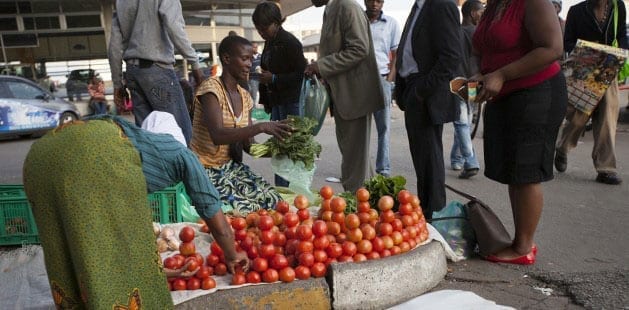Protesting the Zimbabwe government’s failure to pay civil servant salaries and outraged over a new law targeting market vendors who make up the vast proportion of the workforce, working people across Zimbabwe waged a successful one-day shut-down of businesses, government and services July 6.
The “stay-away” day, one of the largest popular protests in years, follows days of unrest over the economic failure of the government, which working people say is unfairly targeting their pocketbooks.
Last month, the government introduced a statutory law that bans imports of basic commodities—a law that directly affects hundreds of thousands of informal economy workers who survive on cross-border trading. Up to 95 percent of jobs in Zimbabwe are in the informal economy, and workers say the new law takes away their livelihoods. Merchants in towns like Beitbridge, which borders South Africa, say sales already are plummeting, and they have waged large-scale protests in recent days.
Requesting the government rescind the law, The Zimbabwe Chamber of Informal Economy Associations (ZCIEA) described it as a “predatory form of governance that shuts all doors of livelihoods to ordinary citizens” by making it impossible for impoverished vendors to afford the new licenses required to trade.
Working People at the Brink
With little formal employment and informal economy jobs under siege, working people say they are being pushed to the brink.
Formal economy workers like teachers do not know when they will be paid because the government unexpectedly moves pay dates. Teachers who would typically get paid on June 18 and 19 have been informed they will receive their June salaries on July 7.
Following the strike action, health workers, who had been told that their salaries would only be available on July 14, have now had their pay date brought forward to July 8.
Public transport workers who make their living on the roads have been especially affected by multiple police road blocks set up to collect fines for such “violations” as not having a fire extinguisher or using manufacturer-supplied temporary spare tires.
In a statement, the Zimbabwe Congress of Trade Unions (ZCTU) urged the government to “honor its obligation of creating employment for its citizens instead of implementing useless policies that result in civil unrest and public outcries.”
Zimbabwe Strike Highlights Economy in Crisis
The downward spiral of Zimbabwe’s economy has been fueled by an increasing number of business shutdowns, layoffs and cash shortages in banks as people pull out money in the unstable environment. The country’s official currency is the U.S. dollar.
Reacting to the July 6 shutdown, the government blocked the Internet to prevent access to social media platforms like the popular WhatsApp. But by noon, Zimbabweans were circulating ways to breach the government firewall and messages started flowing freely. Mobile companies acknowledged the breakdown of the Internet, and more specifically the WhatsApp platform, but did not offer any explanation.

